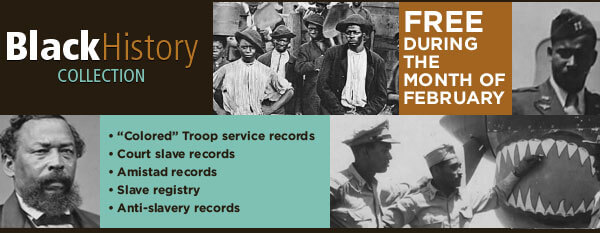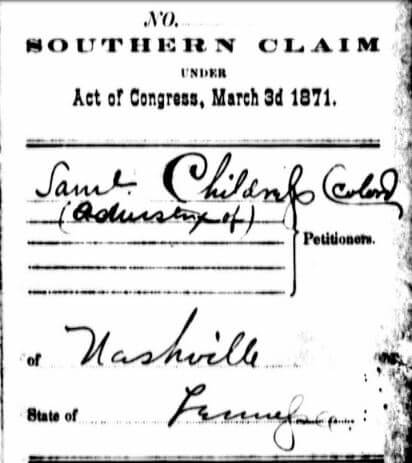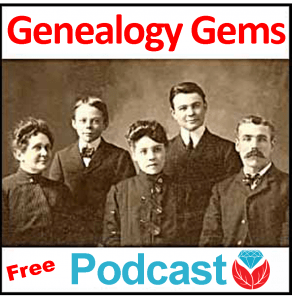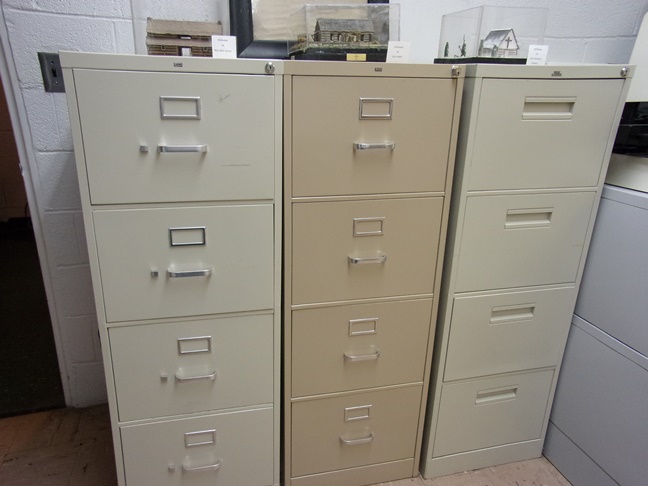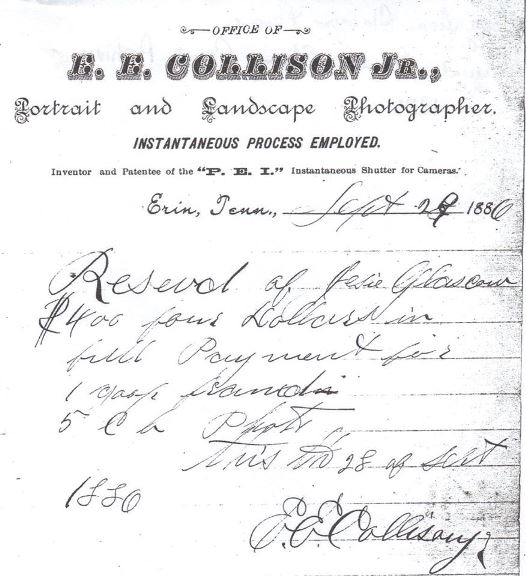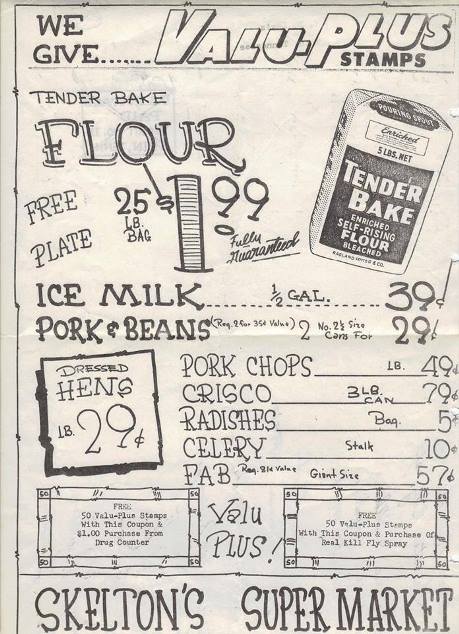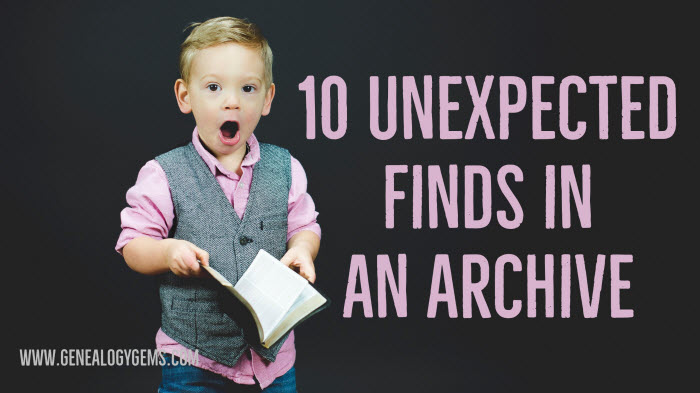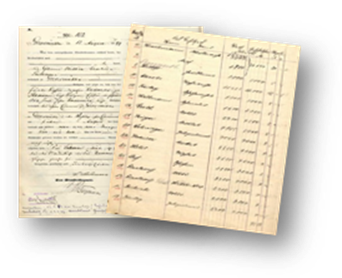Blog

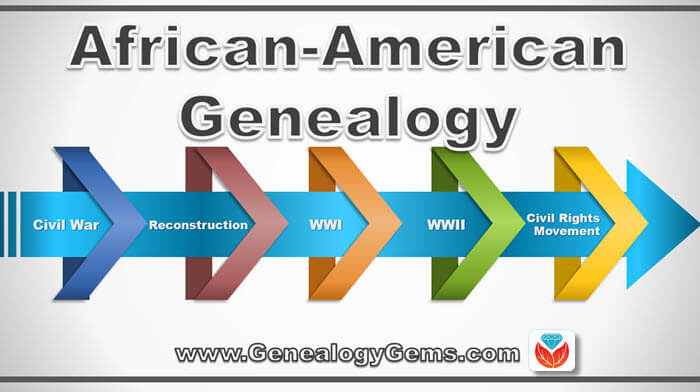
African American Genealogy Records: New and Free!
Explore these African and African American genealogy records in celebration of your family history and Black History Month!
Also this week: see new records online for Southern Claims Commission, GA, NY and VA as well as African heritage sites, Liberia and South Africa. And check out a limited-time offer from Fold3 to view its Black History collection for free.
Black History Collection free this month at Findmypast.com
“In recognition of Black History Month, Fold3 is making the records in its Black History collection available for free through the end of February,” states a recent company announcement. “The Black History collection gives you access to more than a million documents, records, and photos that help to capture the African-American experience during five eras of American history: Slavery, The Civil War, Reconstruction & Jim Crow Laws, World War I & II, and the Civil Rights Movement.
The Fold3 announcement lists several of its richest collections, and we think they’re worth noting individually:
- Danish West Indies – Slavery and Emancipation: These records cover the institution of slavery and the emancipation of slaves in the Virgin Islands during Danish rule, 1672-1917.
- Suppression of Slave Trade and Colonization (1854-72): These records cover the institution of slavery and the emancipation of slaves in the Virgin Islands during Danish rule, 1672-1917.
- Amistad – Federal and Supreme Court records: Court records pertaining to the claims of salvage for the Spanish slave schooner “Amistad,” seized in 1839 by the US Navy.
- American Colonization Society: Documents relating to the American Colonization Society, 1792-1964, an organization best known for its role in founding Liberia.
- Board of Commissioners – Emancipation of Slaves in DC: Records of the Board of Commissioners for the Emancipation of Slaves in the District of Columbia, 1862-63.
- Court Slave Records for DC: Records of the U.S. District Court for the District of Columbia Relating to Slaves, 1851-63, including emancipation and manumission papers.
- South Carolina Estate Inventories and Bills of Sale, 1732-1872: South Carolina court records relating to estate and personal assets.
- Colored Troops: Compiled military service records of volunteer Union soldiers serving in various colored units in the Civil War, including the United States Colored Troops (USCT).
African American genealogy records newly published online
U.S. Southern Claims Commission. The “genealogy giant” Ancestry.com has updated its collection of U.S. Southern Claims Commission, Disallowed and Barred Claims, 1871-1880. According to the collection description, “In 1871 the U.S. government created the Southern Claims Commission, an organization through which southerners could file claims for reimbursement of personal property losses due to the Civil War. Claims could only be filed by residents of AL, AR, FL, LA, MS, NC, SC, TN, TX, VA and WV.” Your African American ancestors may be among those listed therein: “Each claimant was required to provide witnesses. The witnesses had to answer the same 80+ questions that the claimant had to answer. Many of these witnesses were former slaves whose names rarely appear on any other legal document from the Civil War era. They also provided names and dates for family members who often lived on other plantations.”
Georgia. “The records of the Georgia Association of Educators (1921-2015)…are open for research,” reports the George State University Library. “The collection, comprised of unique documents and photographs, provides an in-depth look at the history of the organization that represents many of Georgia’s teachers. The collection includes convention proceedings, contracts and constitutions, meeting minutes, newspaper clippings, audio-visual materials, photographs, and periodicals.” Among the topics covered are the mergers of the previously-segregated black and white state teachers’ associations and integration of public schools about 1970. Click here to explore the finding aid to this collection.
New York. A first-of-its-kind free database documents those involved in the institution of slavery in New York from the earliest times. The New York Slavery Records Index “is a searchable compilation of records that identify individual enslaved persons and their owners, beginning as early as 1525 and ending during the Civil War,” reports the site. “Our data come from census records, slave trade transactions, cemetery records, birth certifications, manumissions, ship inventories, newspaper accounts, private narratives, legal documents and many other sources. The index contains over 35,000 records and will continue to grow as our team of John Jay College professors and students locates and assembles data from additional sources.” A hat-tip to WGRZ.com for publishing this article that alerted us to this valuable new resource.
Virginia. The Journal of Blacks in Higher Education reports, “Students in an introduction to public history class at Roanoke College in Salem, Virginia, created a digital archive of newspaper and other clippings collected during the civil rights era by the Hill Street Baptist Church in Roanoke. The project documents efforts in the area to desegregate lunch counters, movie theaters, and public schools during the 1950s and 1960s.”
African Genealogy and History Resources Now Online
African world heritage sites. CNN.com recently reported on a new online resource that seeks to provide digital preservation and access to important archaeological sites across Africa. “The archaeological wonders of the world offer a rich window into the past,” states the article. “But many are crumbling, weed-laden and victim to vandalism and conflict….Concerned with the decay of African heritage sites, The Zamani Project, based at the University of Cape Town, South Africa, is seeking to immortalize historic spots in three-dimensional, virtual reality-ready models…. Presently, they’ve mapped around 16 sites including Lalibela in Ethiopia, Timbuktu in Mali and Kilwa in Tanzania.”
Liberia. The free “genealogy giant” FamilySearch.org has added over 24,000 new record images and nearly 27,000 newly-indexed names to its free collection of Liberia, Marriage Records, 1912-2015. Documents include “applications for marriage licenses, marriage licenses, marriage returns, documents certifying marriages from Liberia.”
South Africa. FamilySearch has also updated two of its existing South Africa records collections with more indexed names: South Africa, Cape Province, Kimberley, Probate Records of the Supreme Court, 1871-1937 and South Africa, Cape Province, Probate Records of the Master of the High Court, 1834-1989.
Listen to more African American genealogy topics
The free Genealogy Gems Podcast and the Genealogy Gems Premium Podcast have both featured inspiring interviews on African African genealogy research. We recommend these:
Genealogy Gems Podcast episode #201: Angela Walton-Raji joins Lisa Louise Cooke with tips for interviewing African American relatives, learning important history and getting past that 1870 brick wall into the era of American slavery. Listen for free!
Genealogy Gems Podcast episode #200: A university professor shares his discoveries about a mother and young daughter separated by slavery. Learn how he pieced together their story from a poignant family heirloom found at a flea market.
Genealogy Gems Premium Podcast episode #130: Oprah Book Club author Lalita Tademy talks about her book Citizen’s Creek, a novel about an African American and Creek Indian family. This special episode (and all Premium Podcast episodes) is something extra just for our Premium subscribers; click here to learn how to subscribe.
Disclosure: This article contains affiliate links and Genealogy Gems will be compensated if you make a purchase after clicking on these links (at no additional cost to you). Thank you for supporting Genealogy Gems!

About the Author: Sunny Morton
Sunny is a Contributing Editor at Lisa Louise Cooke’s Genealogy Gems; her voice is often heard on the Genealogy Gems Podcast and Premium Podcasts. She’s known for her expertise on the world’s biggest family history websites (she’s the author of Genealogy Giants: Comparing the 4 Major Websites); writing personal and family histories (she also wrote Story of My Life: A Workbook for Preserving Your Legacy); and sharing her favorite reads for the Genealogy Gems Book Club.

Using Vertical Files in Archives
Vertical files in archives are like Forrest Gump’s proverbial box of chocolates: you never know what you’re going to get. The Archive Lady Melissa Barker shows us the fabulous genealogy finds that may be awaiting you in an archive somewhere. The family history you may find may be even sweeter than your favorite truffles.
In the movie Forrest Gump, the character Forrest Gump says: “Life is like a box of chocolates, you never know what you’re going to get.” In an archive, it can be said: “Vertical files are like a box of chocolates, you never know what you’re going to get.” So, what are vertical files?
Vertical files in archives
Vertical files (or subject files as they are sometimes called) can be found in most state and local archives, historical societies, genealogical societies, libraries and even in some museum collections.
Vertical files are a collection of documents and ephemera that are put in file folders which are then put in filing cabinets and cataloged by surname or subject. These files could contain just about anything that can fit into a file folder. Most archives will create an index by the title on each folder but most of the time what is inside of each folder is not cataloged. Vertical files are sometimes seen as a “catch-all” or a “hodgepodge” for all those documents that don’t really go anywhere else but should not be discarded.
Images courtesy of Melissa Barker and Houston County, TN Archives.
Most archivists file family group sheets and genealogical information that has been donated to the archives in vertical files. Other wonderful items found in vertical files could be compiled family histories, photographs, and even receipts like the one shown here for E.E. Collison Jr’s Portrait and Landscape Photography studio.
Images courtesy of Melissa Barker and Houston County, TN Archives.
One of the most popular genealogical items to find in vertical files is newspaper clippings. These clippings could be an obituary, a marriage announcement, a birth announcement or just about anything that has been clipped from the newspaper. Above is an example: an advertisement for Skelton’s Super Market.
Accessing and using vertical files in archives
When doing genealogy research in an archive, ask the archivist if they have vertical files. These collections of records could be very valuable for genealogy research. Some archives don’t always advertise that they have a collection of vertical files, so it’s important that the researcher ask the archivist specifically about this collection. Vertical files are usually stored in back rooms of the archives but the index is available at the archivist’s front desk or they could be on the in-house computer.
Once you have found what interests you in the index, you can request the files that you would like to investigate further. The archivist will retrieve them and bring them to you, sometimes only one or two files at a time. Once you have received the files, you can look at each item and make copies of what is of interest to you and your genealogy research. When you have finished with the file, give it back to the archivist who will then bring other files you have requested.
So next time you are researching at an archive, ask if they have vertical files! Like that box of chocolates,”you never know what you are going to get.”
My motto is, “It’s not all online, contact or visit an archive today!” Read more articles about uncovering genealogy gems in original manuscript repositories–you may soon find yourself visiting one.
Found in an archive: 10 unexpected discoveries
Keeping up: How to know what’s new at your favorite archive
Top 5 questions I get asked as an archivist
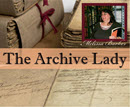
About the Author: Melissa Barker
The Archive Lady
Melissa is a Certified Archives Records Manager, the Houston County, Tennessee Archivist and author of the popular blog A Genealogist in the Archives and an advice columnist. She has been researching her own family history for the past 27 years.
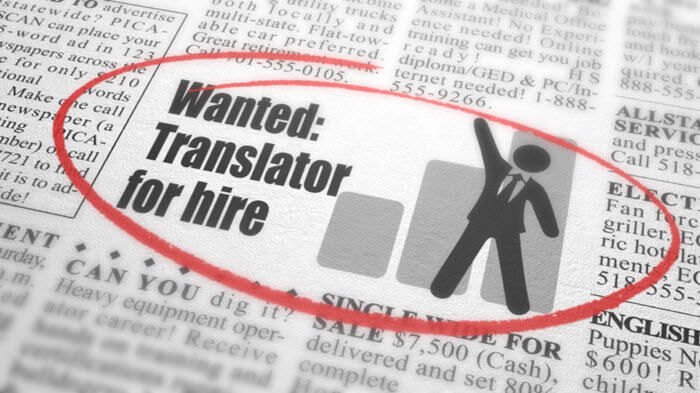
When to Hire a Translator for Genealogy Documents
When should you hire a translator for genealogy documents?
This is a great question, and we’ve invited professional German-English translator Katherine Schober to address it. She specializes in translating genealogy documents. Here’s what she has to say—and don’t miss her top tips for hiring a translator.
“In today’s technological world, the internet does provide some great tools for helping you transcribe and translate your documents. In fact, I’ve previously blogged here at Genealogy Gems about tips and best websites for DIY-translations. (And here’s an even more focused blog post I did on best German translation websites.)
Puzzling out the words
A key reason to hire a professional translator is to be sure the document is read and transcribed accurately. Just like today, no two person’s handwriting was ever exactly alike in the past. So while there are “alphabet keys” to help you transcribe old handwriting letter by letter, your ancestor or a church scribe may have written some letters very differently than the handwriting examples you may be consulting today. The same applies to spelling. German—and many other languages—did not have standardized spelling until the late 1800s. Our ancestors often just spelled words as they sounded to their own ears. This can result in some very unique spelling, and make it impossible for you to find a word in a dictionary or online.
These realities can leave you puzzled and frustrated when trying to decipher a strange-looking scribble. However, translators have seen many variations of letter formation and spellings throughout their careers, and are familiar with these old words and phrases. Something that may take you hours or days to decipher—and may produce uncertain results—is much easier and more reliable when done by a professional.
Along with understanding what’s written, translators who have genealogical or historical specialties also know what information should appear in a church book or certificate. They are very familiar with the formats and phrasings commonly used in these documents, which makes it much easier for them to recognize and translate these.
What your document really means
Hiring a professional translator for your genealogy document is best when you want to be absolutely certain of its overall meaning—not just its word-by-word translation. In the genealogical field, certain words and phrases have layers of historical meaning. Some of these meanings actually varied by time period and location. A professional genealogy translator would be able to accurately convey the meaning of a word or phrase for your specific document, not just a cookie-cutter dictionary definition.
A translator will also be able to provide more information on the material found in your document. For example, I always use footnotes to inform my client of the historical context of an event mentioned in passing in a text, of additional meanings of a word that the author may have been trying to convey, of the meaning of certain symbols in church books and certificates, and so on. This helps you to have a more thorough and accurate understanding of your ancestor’s document, which can help you to discover more clues later on.
Tips for hiring a translator for genealogy
1. Hire a native English speaker (if your document will be translated into English).
In the field of translation, the number one rule for most translators is to only translate into your native language. Why? When writing a document for a client, the translator should be 110% confident of every word he or she types, understanding every small nuance the translated word might convey to you, the English reader. The text usually also reads much more fluently if written by a native speaker.
That being said, there are of course exceptions to every rule: there are many translators who grew up in bilingual households, as well as talented linguists who do translate accurately and write well in both their native and non-native languages. As a general rule of thumb, I would say that if you are translating a diary or a letter, hire a native English speaker to be sure that your document will read well and accurately in your own language. If you are translating a certificate or a record where it’s more about individual words and phrases, this is likely not as important.
2. Ask for their credentials and experience.
Nowadays, most translators have websites which list this information, but if not, feel free to ask them. In the age of the internet, trust is important, and translators understand that you need to trust them with your project and your financial investment. If they have a review section on their website, check out the reviews before going forward with your project.
3. Get a clear understanding of project cost and time required before beginning your project.
Experienced translators should have many projects under their belts, allowing them to provide you with a general idea of cost and time required for your translation. For example, before I quote a project, I look at past projects of similar format and handwriting (is it a church book? a diary? a certificate?) and look at my records on how much time was required for those specific jobs. I am then able to accurately convey to the client how much time I will need for his or her translation, as well as how much it will cost. It is important to discuss these things ahead of time so that there are no surprises for either person upon completion of the job.
How to find a translator for genealogy
Of course, if you need a translator for your German genealogy document, I’d love to hear from you. Feel free to write me any time through my website, www.sktranslations.com. You can also learn how to read German script with my fun and easy to follow online course available here.
If you’re looking for another language, try these online directories:
American Translators Association. From the home page of this website, under Find a Translator or Interpreter, click where it says Click here for advanced options. For an initial search, you can skip some of the fields and just focus on the ones shown here. Enter the language in which the document is written and your language (in which to translate it). Then scroll down to the Area of Specialization field. From the drop-down menu, under the Social Sciences category, choose genealogy or history.
Explore more foreign-language genealogy resources
The Genealogy Gems website is packed with more tips to help you explore your family history in another language. To search for the ones you need, click here to return to the home page. Then use the category search on the left side. There’s a translation tips category, but there are also plenty of articles on researching German, Irish, Italian, Scandinavian and other ancestors whose records may be in a language you don’t speak. Start reading–you may find just the tip or tool you need to bust through your foreign-language family history brick wall.


